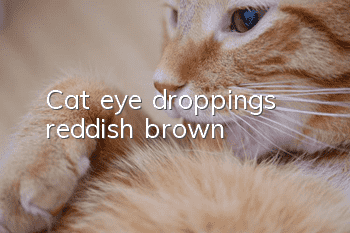Notes on clinical medication for cats and things about pets!

There are also many precautions when using medicine for cats
Drug treatment is a good treatment for diseases, but it does not mean that everything will be fine with drug treatment. It must be effective. In the use of drugs, There are also many things worth noting, such as dosage and usage. There are many pet medical accidents caused by improper medication. Doctors must have rich experience and knowledge when prescribing or administering medication to prevent accidents from happening. The probability is reduced to a minimum.
1. Choose the appropriate method of administration
How to use it more safely and effectively When drugs treat diseases, the way they are administered clinically is very important. The choice should be based on the severity of the disease and the condition of the body. When the medication effect is similar, try to use the safest method of administration. If it can be used externally, try not to take it internally; if it can be taken internally, try not to use injection; if it can be injected, try not to give it intravenously.
2. Rational combined use of drugs
In order to be more effective and manifest faster clinically To determine the therapeutic effect of drugs, most veterinarians will use combination drugs. However, the combination of drugs must have theoretical support and clinical application experience. Do not blindly combine medications, as this will be counterproductive.
In terms of side effects of drug compatibility, roxithromycin and aminophylline are incompatible, otherwise it will cause aminophylline poisoning, vomiting, high fever, convulsions, shock and death; inosine grape bran injection and Vitamin B12 is incompatible. If it is incompatible, poisoning and death may occur. When it must be used, it should be done step by step. Ceftriaxone cannot be diluted with Ringer's solution and must be infused intravenously. Otherwise, it will also cause collapse, inability to stand up, and shock. And death. Therefore, pet doctors must carefully consider the physical and chemical properties of each drug when prescribing it for pet treatment. Especially antibiotics with serious side effects must be used with caution.
3. Symptomatic use and no abuse
The indications of each drug are: When using drugs clinically, one must have a thorough understanding of the drug's working principles, clinical side effects, and strict control of dosage and treatment duration. Safety first, do not use medicines at will or mix medicines at will. This way of using medicines is irresponsible.
4. Pay attention to the unique biological characteristics of cats
Cats like to eat meat and fish kind. The senses of smell and taste are developed. Oral administration is more difficult. The vomiting center is also developed. Cats are sensitive to pain, so care should be taken when administering various medications.
5. Pay attention to the cat’s sensitivity and allergic reactions to medicines
There are certain differences in drug sensitivity among different species, genders, ages, individuals, and physiological and pathological conditions. Clinical medication for young and elderly cats sometimes needs to be appropriately reduced, and careful observation and continuous adjustments are required after medication.
A cat's allergic reaction manifests itself as difficulty breathing, vomiting, swelling of the eyes and face, and sometimes thrashing, irritability, and hissing. Desensitizing drugs epinephrine, dexamethasone, chlorpheniramine. Clinically, the main drugs that are likely to cause cat allergies are: vitamins, Chinese herbal medicines, vaccines, etc.
6. Adopt comprehensive treatment measures
Three points of treatment, seven points of nursing, clinical It is necessary to have a comprehensive concept to treat diseases. Only through overall observation, good care, and enhanced resistance and immune function can pets be restored to health more safely. It is important to remember that sometimes medications alone cannot cure diseases.
7. Precautions when using anti-inflammatory drugs
Special anti-inflammatory drugs for cats include Shimeifen. Anti-inflammatory drugs such as Baili, Sunuo, Mafo, etc. should be used with caution or at a reduced dosage in patients with moderate renal failure, and even more cautious use should be considered in patients with severe renal failure. Cephalosporin drugs are not recommended when renal function is abnormal.
- What happens when a cat vomits yellow water? Causes and treatment of cats vomiting yellow water!
- What is the personality of a Siberian cat?
- Common treatment methods and precautions for cat ringworm
- Why do cats like to bite things and how to correct them?
- What types of deworming drugs are available for cats?
- How to prevent cat anuria
- There is black dirt on the kitten’s nostrils
- Why does a cat cough?
- Five types of cats that shed less hair
- Why do cats in heat keep meowing?



